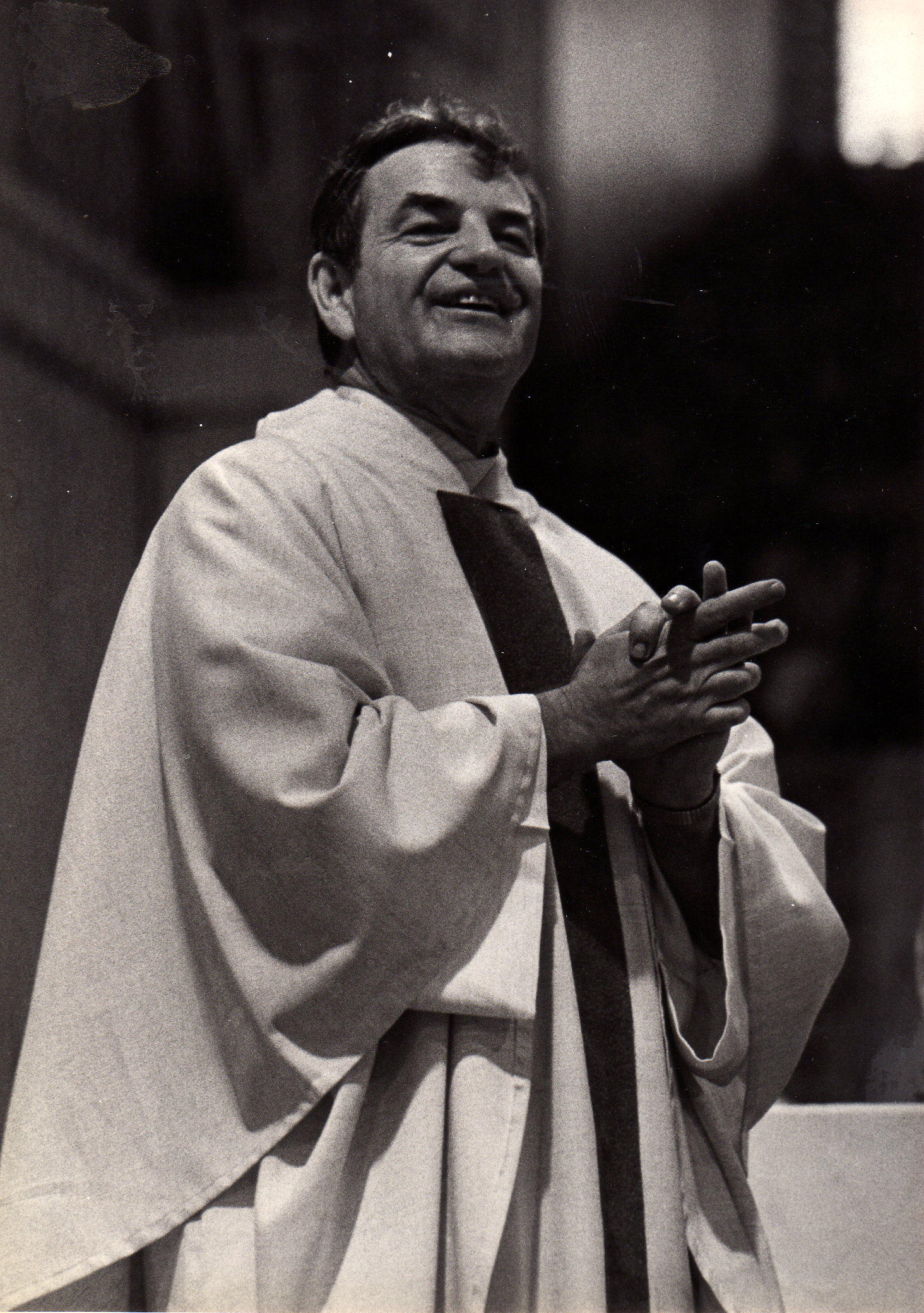
by Libby | Feb 28, 2022 | EverMore Mindset, Marital Spirituality
by Libby DuPont
Lent is a beautiful time to grow closer to God, but it looks different for married people than it did when we were single. Here’s some DOs and DON’Ts to help make your Lent a success:
DO consider what will bring you closer to your spouse.
Growing in love for your spouse is the primary way that God will draw you to himself. So, while things like giving up chocolate or taking extra prayer time are wonderful, you can also grow in holiness by going on a date with your spouse or learning how to communicate better.
DON’T take on a penance that will make life miserable for your spouse.
Does giving up coffee make you mean? Will attending an extra Bible study leave your already-stressed-out spouse to handle the kids alone? Will that service project take you away from a project your spouse has been asking you to do forever? If so, consider something else!
DO think about praying, fasting and giving alms TO and FOR your spouse.
Who is better candidate to pray and fast for your spouse than you? Also, consider giving extra time, attention, affection or small, thoughtful gifts to your beloved. Try the trifecta: skip a lunch or treat (fasting), offer it for your spouse’s intentions (prayer) and spend the money on something that will make your spouse feel loved (alms)!
DON’T think that Lent needs to be all doom and gloom to be successful- some of the best alms you can give are a joyful attitude!
St. Augustine said, “Joy is the infallible sign of the presence of God.” A great attitude will bless the whole house!
DO consider praying together.
Start from wherever you are (even if you have never prayed before, just say a Hail Mary together!), and challenge yourselves to go deeper.
DON’T be tempted to develop parallel spiritual journeys that you never share.
Our faith in God (even if we have no faith at all) is a deeply personal part of us, and it helps to shape our values and worldview. If we never share such an important part of ourselves, our relationship is doomed to be superficial.
DON’T fast from time spent loving your spouse (ie date night).
You are allowed to have fun with your spouse during Lent, especially if it brings you closer. Consider turning off TV and investing in something new like taking a walk, playing a game, listening to music or reading together.
DO remember that romance and affection are HOLY!
Being “in love” is a profoundly holy disposition of soul. When we are romantic and affectionate toward our spouse, we are more patient, more forgiving, less critical and more generous.
Join us this Lent for a Weekend Immersion, or for our upcoming online Smart Loving Date Nights!

by Fr. Chuck Gallagher, S.J. | May 20, 2021 | EverMore Mindset, Marital Spirituality, What is marriage?
by Fr. Chuck Gallagher, S.J.
The whole world is screaming for community. Everybody admits the need for community – from sociologists and academics down to the normal man on the street. No one can deny the tremendous heartfelt need for closeness, roots, involvement in the lives of others, and for a caring community. We all want to care for others and be cared for by others.
And that is what is held out by Jesus. That is what the Church is all about – to bring alive the statement of Jesus that we are to love one another as he has loved us.
But in order to understand this community of love we are called to be, we have to get back to St. Paul’s great mystery. That is our bedrock – that the way a husband loves his wife reveals how Jesus loves the Church. We need to look to Matrimony. We need to examine it and see that our married people understand their own significance.
One of our problems, though, is that we don’t have an adequate understanding of any vocation, never mind the vocation of Matrimony. We keep mixing career and vocation. For example, we make being doctor or a lawyer or a teacher a vocation. It’s not – it’s a career, and a very good and very beautiful career that offers the possibility of a high level of service in accordance with the Gospel. But service (or ministry) looms too large in our consciousness. It takes too big a place in our understanding of what being Gospel is. We think the prime, almost exclusive mission Jesus Christ has called us to, is one of service rather than one of love, or to be more fair about it, we’ve equated love with service.
Service can be and frequently is an expression of the love that exists between people, but the real love is the relationship we establish with one another and that is only symbolized by what we do for one another.
Really, there are only four vocations in the Church: Matrimony, Dedicated Single Life, Religious Life and Priesthood. Each one of these vocations is a unique way to love within the faith family. The fact is that a vocation doesn’t focus on what we do. It’s a call to a specific relationship to the rest of the faithful. It is this relationship with the people of the Church that is our call and it is this we have to spend our life to establish.
How we exercise our talents can be our career. It might be as a librarian, a teacher, a director of religious education, a counselor, a social worker or what have you. Career or profession, then, concerns itself with ministry. Whereas vocation concerns itself with a way of life. Fundamentally, being a member of the Church is to commit myself to a way of life.
All too often, however, we look on vocation in terms of what we do: What do I do as a priest? What do I do as a sister? What do I do as a committed baptized-confirmed person? But that’s the second question. The first question and the basic one for the adult in the Church is: What fundamental relationship am I going to have with the people of God? As a celibate in Orders? As a celibate in community? As a married person? As a celibate lay person?
Only then can I ask myself: How am I going to spend that relationship in your midst? How am I going to spend my marriage? My Orders? My community? How am I going to express, in concrete terms, my relationship with my fellow believers? Whether that relationship is direct, such as priesthood, or indirect, such as marriage or religious life.
And when we grasp this idea of vocation, then we can begin to approach an understanding of the Sacrament of Matrimony and therefore of the Church.
Fr. Chuck Gallagher, S.J., was the founding director of the PMRC (now EverMore in Love). He was a compelling and prophetic voice in the Catholic Church for the Sacrament of Matrimony and the joy of the incarnation for over five decades, also founding Worldwide Marriage Encounter. This post is an excerpt of Fr. Chuck’s book, One Flesh

by Libby | May 10, 2021 | EverMore Mindset, Integrated Sexuality, Marital Spirituality
by Libby DuPont
We were sitting at the table eating breakfast on one of the first Spring days warm enough to have the windows open, enjoying the chorus of birds in our yard. I was reflecting on how much joy it brings me to hear that sound of new life after the long, silent winter, when it occurred to me: Why don’t I ever notice when the birds leave?
We had the same experience several years ago in our marriage at our first Weekend Immersion. When we left on Sunday afternoon, it felt like the birds were singing, the warm breeze was blowing and our marriage was alive with new possibilities. We had been married 8 years at that point, and by no means was our marriage in trouble. Still, there was a spring in our step and a lightness of heart that we had on our wedding day, that had somehow gotten lost along the way. The scary part is that, like the birds, we didn’t notice it was gone until it reappeared.
This is part of what’s behind the name EverMore in Love.
Relationship is dynamic. If we’re not growing closer, we’re growing further apart. And honestly, if we are slowly drifting apart, we often don’t notice until there are serious hurts between us. So why not focus our efforts on trying to be intentional about growing closer? What if we measured the success of any given day, week or year with the answer to a simple question: Am I more in love with my spouse now than I was then? Am I more attentive and generous? Do I understand more about his/her interior self? Have I affirmed him/her more? Are we more playful, more flirtatious, more appreciative?
The best thing about marriage in the Catholic Church is that it’s a sacrament. With sacraments, there’s never just more, but ever more! We would be horrified if we went to Reconciliation and were told there was a shortage of grace, so we needed to pick just one or two sins to be forgiven. Or, imagine getting to the front of the Communion line and being told that the guy in front of you used up the last of the graces. Ridiculous! Yet, when we settle for “just getting along” with our spouse, we are selling short the graces of the Sacrament of Matrimony in the same way.
That we have been entrusted with a sacrament is an astonishing gift, one that we rightfully respond to with wonder. Since we are married not to an idea, but an actual person, this wonder is rightly directed toward someone, toward our spouse! And what is “wonder” but going beyond love to being “in love”?
Just as we approach God for ever more patience, or humility or generosity in general, we can go to him and ask to be ever more in love with our spouse. That’s what we’re about around here. We hope you will join us in this noble pursuit!
Brad and Libby DuPont have been married since 2003 and live in Overland Park, KS with their son and daughter. They have been involved in national leadership for EverMore in Love for several years, and Libby currently serves as Director. They are grateful for strong coffee, decent wine and the fact that they both found someone who laughs at their jokes (usually).

by EverMore | Mar 1, 2021 | Integrated Sexuality, Marital Spirituality, Marriage Hacks
by Kathy and Ron Feher
We know firsthand that you can live in love every day. Being in love is not a stage we grow out of. It is not about hormones or libidos. We can choose to be in love. There is a difference between loving and being in love. We love a lot of people we are only in love with one.
Top 5 Reasons to prioritize being in love in marriage:
When we are “in love” the work of marriage is fun! Nothing is difficult when we are in love, talking, spending time, making love. So it is smart loving and an economy of effort to focus first on nurturing that atmosphere of being in love so that it greases the skids for everything else. Too often we have it backwards; we focus on tasks and activities and problems that drains us. It is not rocket science to figure out what makes your wife or husband feel in love. Once you do then you just do it unilaterally and proactively and you both feel in love!
When we are in love our kids feel most secure, and we are most generous and patient with them. Also, if we want our children to wait for marriage we have to show them marriages that are worth waiting for!
- It invites more joy into our lives and evangelizes those around us.
A couple in love is the quintessential evangelizing event. Everyone is drawn to a couple in love that is why we all love weddings. The world needs to believe that love is possible and love is real. St. Augustine tells us that “Joy is the infallible sign of the presence of God “!
- It is our primary way to holiness in our vocation of marriage.
Falling in love is a conversion experience that it gets us out of our selfish self to care more about the other. Being in love makes us other centered which is profoundly holy. Pope Benedict teaches us that “authentic sexual ecstasy is an exodus from self”
- When a couple is in love in the Sacrament of Matrimony they reveal and manifest Christ’s love for the Church.
We are called to love each other as Christ loves the church, not just for our own sake but for the sake of those around us so they can understand and experience how Jesus loves them. Jesus does not just get along with us. He is passionately and intimately head over heels in love with us!
Ron and Kathy Feher, together with Fr. Chuck Gallagher, S.J, are founders of the PMRC (now EverMore in Love) and have authored all our programs. Parents of 10 children, they have been married over 50 years and have been joyfully living the insights and skills they share.

by EverMore | Feb 20, 2021 | Marital Spirituality
by Tom Callahan
Thomas Merton once gave a talk about living a life without cares. His premise was that, in the monastic life, the monk focuses his time and effort on loving God, and, in turn, God focuses his time and effort on loving the monk. As a result, the monk can enjoy a life without care, because God is taking care of everything for him.
While Merton was speaking in the context of a Trappist monastery, this same premise exists in the matrimonial vocation. We are children of God trying to love him through our commitment to our spouse. God, as our Father, will in turn love us and take care of everything for us. God wants us to delight in him, rely on him, and set the world on fire with his blazing love.
It’s worthwhile to step back and reflect on this wonderful gift. God loves us each individually, he has a specific call for each of us, and this call is more amazing and impactful than anything we could dream for ourselves. To be in relationship with Jesus Christ is to possess happiness.
Any relationship, married or otherwise, depends on good communication. Our relationship with God is no exception to this rule. As a result, prayer is essential. To pray, to love God and communicate with him, is our way of coming to participate in his call. It is our entrance point into the life without cares, and it is the foundational support enabling us to receive God’s help to live out the married vocation. God is our father and we are his children – he wants to hear from us, he wants to talk to us, he wants to be in relationship with us.
Everything we do has a ripple effect out into the world, far beyond what we can see. In this way, the world is depending on us to have a deep prayer life. We live in a world starving for love. It is increasingly marked by loneliness and an insidious despair that masks itself under the guises of freedom, activism, and self-determination. God sees this suffering and, by choosing us for matrimony, has given us a role to help cure the world’s problems. It is thus critical for us to understand that while prayer is about our relationship with God, it also is about other people. The world needs saints. It needs to know that it is possible to live in love, and what better way to do it than by witnessing the example of people who are doing just that. It can be said without exaggeration that a good prayer life is the root contribution to saving the world.
Often, our experience in prayer will be dry. In addition, we have our own brokenness and sinfulness. It can feel like God’s lofty call is not for us, that we are destined to fall short and settle for mediocrity. These negative sentiments are lies, and it is important that we reject them. Remember that God is our loving father. He knows us better than we know ourselves. If we trust him, persevere, and recognize our need for him, he will do everything for us. He will take us into his arms and lift us up into the heights of holiness.
Will we be able to see the fruits of prayer? It is important that we stay humble, and so, to a certain extent, God will blind us to the good fruit. Still, reflecting on our own marriage, we can offer a couple insights. We try to pray together daily, and the effect of this commitment has been a certain “gravitational pull” to the good. At one end, our relationship has become less susceptible to sinful distractions such as gossip, criticism, and general negativity. At the other end, it has been easier to commit to daily tasks such as chores and affirmation. In no way are we saying our relationship has no sin, and we are not saying it is easy to commit to the good – but our prayer lives have enabled God to lift us up regardless of the challenges imposed by life circumstances or our own weakness.
Tom and Theresa Callahan have been married since 2015. They have been mentoring the engaged through EverMore in Love since 2017. Tom works as an actuary and Theresa works as a caretaker. They live in Philadelphia.

by EverMore | Feb 15, 2021 | Marital Spirituality, Marriage Hacks
by Libby DuPont
I have often heard husbands or wives, married a few years, lament that they just don’t have the same relationship with Jesus they were able to have as a young single. This is true. A young, single person may have had hours free to spend at Adoration or daily Mass, the married person now may have a demanding work schedule, meals to cook and kids who don’t sleep. But luckily, Jesus doesn’t want the same kind of relationship we used to have as single people! He wants to meet us right where we are, and He wants to use our joyful, passionate marriage to bring us closer into relationship with Him.
As a result, we need to approach everything in our spiritual lives through the lens of our vocation. This means that our Lent may look different than it did when we were single, but that’s good! Let yourself off the hook for endless hours of prayer and harsh fasting if those things no longer suit your state of life. Instead, here’s some ideas on living Lent as a husband or wife.
Prayer
– If you’ve never prayed together before, try it! A simple, memorized prayer or blessing before bed is a good place to start.
– Meet up for a daily Mass, Stations of the Cross or time of Adoration during the week.
– Set your phone alarms to remind you to pray that God would show you what your spouse most needs.
Fasting
– Plan a date night where you do all your spouse’s favorite things (the ones that aren’t yours!)
– Give up a treat and spend that money on your spouse.
– Let your spouse have control of the remote, the radio station or the menu… whatever he/she normally does not get to pick.
Almsgiving
– Learn your spouse’s preferred means of receiving love and then do it like it’s your job! (Things like affirmation, affection, listening, small, thoughtful gifts, time spent together.)
– Perform some service for others TOGETHER. The witness of your love is a double blessing.
Brad and Libby DuPont work for the Archdiocese of Kansas City in Kansas, and are the directors of EverMore in Love. They have been married for 17 years, and live in Overland Park, KS. They love a good cup of coffee, a decent glass of wine and the occasional living room dance party.






